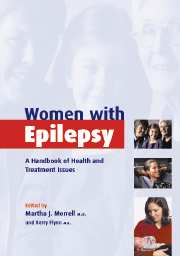Book contents
- Frontmatter
- Contents
- List of contributors
- Part I The woman with epilepsy
- Part II Epilepsy diagnosis and treatment
- Part III Hormones and the brain
- 10 Brain differences
- 11 Sex hormones and how they act in the brain: a primer on the molecular mechanisms of action of sex steroid hormones
- 12 Epilepsy and the menstrual cycle
- 13 Menopause and epilepsy
- Part IV Health challenges for women with epilepsy
- Part V Family planning, pregnancy, and parenting
- Part VI Living well with epilepsy
- Appendix: The Epilepsy Foundation's Campaign for Women's Health: bringing help and hope to women with epilepsy
- Index
- References
12 - Epilepsy and the menstrual cycle
from Part III - Hormones and the brain
Published online by Cambridge University Press: 02 November 2009
- Frontmatter
- Contents
- List of contributors
- Part I The woman with epilepsy
- Part II Epilepsy diagnosis and treatment
- Part III Hormones and the brain
- 10 Brain differences
- 11 Sex hormones and how they act in the brain: a primer on the molecular mechanisms of action of sex steroid hormones
- 12 Epilepsy and the menstrual cycle
- 13 Menopause and epilepsy
- Part IV Health challenges for women with epilepsy
- Part V Family planning, pregnancy, and parenting
- Part VI Living well with epilepsy
- Appendix: The Epilepsy Foundation's Campaign for Women's Health: bringing help and hope to women with epilepsy
- Index
- References
Summary
Many women with epilepsy find that seizures are more likely to occur at certain times of the menstrual cycle. Menstrual-associated seizure patterns (called catamenial seizures) have been written about in medical textbooks for hundreds of years. We finally understand why these seizure patterns exist. As Dr Herzog and Ms Shafer discuss, fluctuations in the levels of the hormones estrogen and progesterone over the menstrual cycle cause changes in brain excitability. This changes the seizure threshold. Generally, seizures are most likely to occur in the days preceding the onset of menstrual flow and at the time of ovulation. Understanding seizure and hormone relationships could lead to new treatments. Some trials of hormone therapies in women with menstrual-associated seizures are now underway.
Dr Andrew Herzog is an Associate Professor of Neurology at Harvard Medical School. He has received funding from the National Institutes of Health for his research into hormone effects on seizures. He was truly one of the pioneers in this field and continues to be an active researcher, author, and lecturer. Dr Herzog serves on the Epilepsy Foundation Professional Advisory Board. Ms Patricia Osborne Shafer is an Epilepsy Clinical Nurse Specialist at Beth Israel Deaconess Medical Center. She has been active in the Epilepsy Foundation in a number of capacities, most recently as a member of the National Board of Directors and as incoming Head of the Professional Advisory Board. In this chapter, these two highly qualified individuals provide information about this important topic.
MJMKeywords
- Type
- Chapter
- Information
- Women with EpilepsyA Handbook of Health and Treatment Issues, pp. 119 - 130Publisher: Cambridge University PressPrint publication year: 2003

